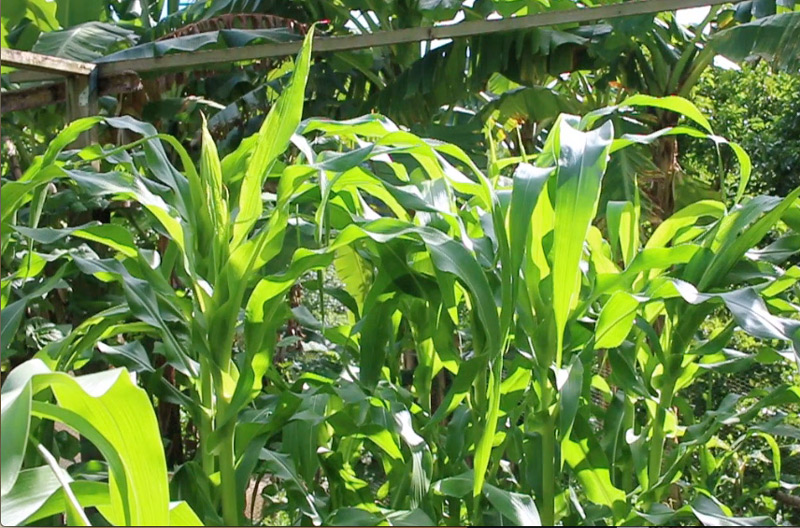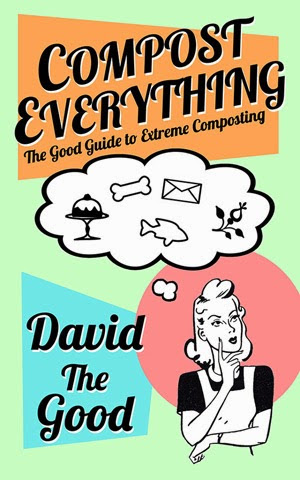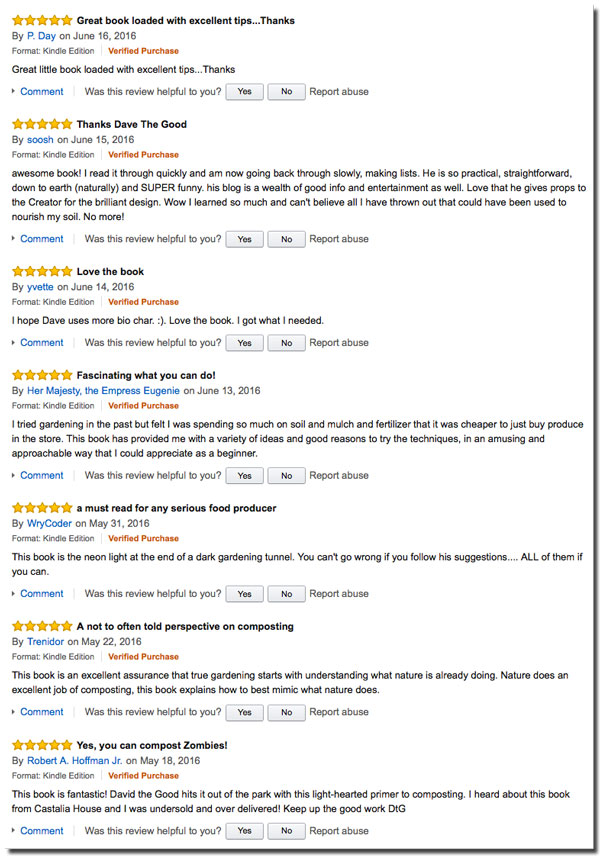Last week I posted a video on my easy compost tea recipe. Making this powerful fertilizer at home requires little infrastructure and zero cost:
I know that it’s not the “recommended” way to make compost tea; however, it feeds the soil excellently as my corn testifies.

That corn ate nothing but my compost tea. I’ve been asked about the “recipe” but it varies from batch to batch. That said, here is a close approximation even though I’m often changing the ingredients and amounts.
Easy Compost Tea Recipe
Tools required:
Barrel or bucket
Strainer
Clothespin for your nose
Ingredients:
Manure (can be substituted with various plants, compost, urine or fish guts)
Compost (optional)
Urine (optional)
Moringa or alfalfa (optional)
Weeds (optional)
Epsom Salt (optional)
Fish Guts (optional)
First, find some manure you know is free of pesticides. Put 2-3 shovelfuls in the bottom of your barrel and then fill the barrel another 2/3rds with water. Stir the manure up so it doesn’t form hard clumps. Fresh is much better than dried. I’ve used chicken, cow and rabbit manure at different times, all with good success.
Substitutes for Manure
If you don’t have manure, substitute something else that is high in nitrogen. In a tropical climate, a bucket of moringa leaves is great. If you live further north, alfalfa is excellent. In the absence of either of these plants, hunt for a nitrogen-fixing species. Peanut hay, leucana, etc. are all rich in nitrogen. Compost is another option; however, it’s not usually all that high in nitrogen. Urine works excellently though you’ll want about 3-5 gallons of it for a 55 gallon drum of compost tea, so start saving it up now. Fish guts are very good but stink to high heaven and attract the vultures. I use them anyway.
Now that you have your base nitrogen mix, add some mineral diversity with other things you may have lying around. Tithonia diversifolia leaves are great as are thistles and other weeds. Everything from pokeweed to mulberry works; just realize that if you have more fibrous leaves they won’t break down quickly. Softer is better.
Epsom salts are a good addition if you have them. I usually chuck in 2 or 3 cups in a barrel for magnesium and sulfur.
Finally, fish guts are wonderful sources of fertility but they do smell amazing. I share how I make homemade fish emulsion in my Compost Everything movie. It’s filled with minerals.
After you have your ingredients and water in the barrel, let it rot down for a couple of weeks. Stir vigorously when you think of it, though it’s going to work no matter what you do.
Putting it to Use
Once my compost tea is all rotted down and looks like coffee in the barrel, I dip into it and pour it out through a strainer into another container for longer-term storage.
This is where you put the clothespin on your nose (extra points if it’s a Planet Whizbang clothespin).
I leave the last foot or so of tea in the original barrel, then start a new batch while retaining that bit as a “starter.” Because that material is already filled with bacteria, it gets the next round going a lot faster.
If I’ve added a bunch of material to the mix, I thin it out before I water any of my plants. If it was already a “thin” batch, I just use it as-is.
I water by filling watering cans and walking down the rows of plants, soaking the soil between them. It also works well as a foliar feed but may need thinning to avoid damaging more tender plants.
Objections and Cautions
But wait, David The Good – isn’t this “easy compost tea” stuff totally anaerobic and therefore EVIL?
Yes, it’s completely and utterly evil and I am a terrible person and a horribly irresponsible gardening author for sharing this method.

“Reach out with your laziness… embrace the power of anaerobic compost tea… yessssss… yesssssssss!!!”
I started doing this as an experiment. I don’t like running aquarium pumps. I’m not interested in filling ladies’ stockings with finished compost and dunking them like teabags. I want fertility for the garden and I don’t want to work that hard for it.
The experiments worked incredibly. Plants love it. I don’t care if it’s “wrong” – it works!
CORN!

NOTE: I don’t use this compost tea to water plants I’m going to directly eat. I stick to corn, beans, fruiting plants and young vegetables that are getting established. Getting it on the lettuce? No. Bad idea.
More on Composting
There’s an entire chapter of my book Compost Everything: The Good Guide to Extreme Composting sharing methods for stretching compost, of which this is one of my favorites. If you only have a little material to start with, make it into some easy compost tea and stretch it over a big area.
Compost Everything, by the way, keeps getting great reviews:
I didn’t come up with all of these systems myself: all I did was pay attention to what the Creator had already designed and then start putting those observations to work in my garden.
 If swamp muck is great for the garden, why not make it in a barrel?
If swamp muck is great for the garden, why not make it in a barrel?
If a little sourdough starter can be stretched a long way and inflate many loaves of bread, why not take a little of the previous batch of compost tea and add it to the next one?
If trees fall to the ground in nature and turn into great soil over time without turning or proper ratios, why should I bother working so hard on my compost piles?
If you don’t own the book, I highly recommend it.
(Of course, I wrote it, so I would.)
It’s also available in audiobook format, read by me.
Catch you all tomorrow, folks. You’re the best.
UPDATE: I made an ad!




11 comments
Hello David,
I’m delighted to see that “Compost Everything” is now available in paperback. My electronic version is just not as nice as the real thing. So, I just ordered a few copies. One for myself, and three to use as prizes for Planet Whizbang Giveaway #5, which is scheduled for the 2nd week of July. More people need to know about your books!
Thank you. Grow or Die is as well. Both have been selling excellently, as has Totally Crazy Easy Florida Gardening. I am blessed. Very glad to hear about the giveaway – fantastic! I have a Whizbang-related photo I need to send you soon, too.
Soooo this compost yes is Kombucha for the garden! It works just like making my kombucha, save the scoby and some starter for the next batch! Sounds easy, throw in some molasses or sugar and it may really get a kick on the pants. If you are actually making Kombucha as I do, toss any extra scobies into the blender with a bit of starter and put them into the barrel too.
Great analogy! I love Kombucha. My wife has made it with varying degrees of success. When it’s good, it’s very very good. When it’s bad, it’s horrid. :-)
Plants don’t care if compost is anaerobic or not:) Simplest way to make compost ever is next time you clean up your property take all the leaves and junk along with a little manure and put in big plastic leaf bags. Drag it behind the shed or somewhere and wet it down and tie up the bags.
Leave for a year, two is better, and when you tear the bags open you have Compost! For the most part, anaerobic is slower than using O2 but it works just as well.
Nice to see you here, Ray.
Yep, that method works. I like how low-work it is and I believe it makes better compost than quickly turned piles.
The benefit of this barrel method is that I get fertility fast, which is important right now since we’re just starting a new homestead. I stay away from the rough stuff and just use fast-rotting materials.
I tossed in a bunch of frozen fish in one barrel with water. And I’ve been soaking and rinsing seaweed in another to rinse the salt in another. The seaweed is on its second soak. The fish has been brewing for a good 2 months or so and I’m about ready to strain and pour them both on my back yard garden. But I’m wondering how long I should wait to eat my carrots beets and potatoes after I pour the fish schlop on? And if I rush drowning my garden in salt if I use the next seaweed tea? There was probably a gallon of seaweed and fish in each of my 5 gallon buckets.
I would just make sure that it’s rained well a couple of times after application. As for the salt, I’ve found that washing the seaweed in fresh water once is enough to keep it from killing anything with salt. I usually thin the liquid fertilizers by at least half before application, particularly if I’ll be getting it on the leaves as well. Good for you for experimenting!
Awesome!! Thanks for replying!! The best part is they are practically free, and fun in a crazy kind of way. Gonna crack the fish bucket this weekend for sure then and give it ago. I’m sure at least my cats will go crazy over the smell!
Oops, I meant *risk drowning my garden in salt.
[…] But, don’t blame us if after reading the book, you have the desire to create your own Compost Tea […]
Comments are closed.